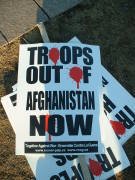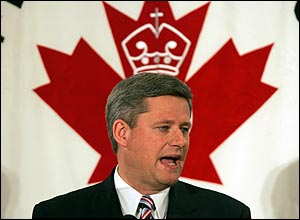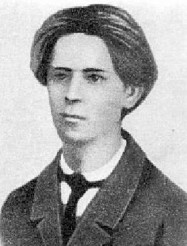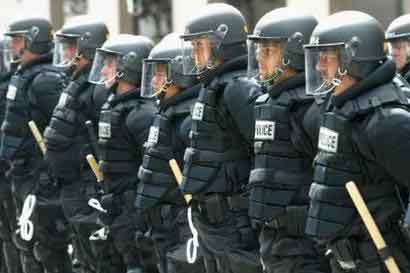 Is what the headline should read.
Is what the headline should read.Instead of the apologistics of the Minister of Defense. This is Canada after-all and yes we can decide which missions we want to go on. Thank you very much. Especially when our troops were lied to. Those who signed up under the impression our National Policy was Peacekeeping, now are working under the Harpocrites private agenda of War Making. They were mislead.
Soldier not misled: Minister
OTTAWA—Defence Minister Gordon O'Connor has responded to a young soldier's concerns that he was "misled" about Canada's Afghan mission with a tough rebuttal of his own: "This is the military. "You don't vote in and vote out of operations. Family and friends have painted Boneca as a disillusioned soldier deeply unhappy about this mission. Their comments have highlighted the mounting stresses on Canadian troops caught up in fighting a shadowy enemy in scorching temperatures."He hated it over there. He was misled as to what was going to be there when he got there, and what he would be doing. He was very mad about it," Larry DeCorte, his girlfriend Megan's father, told the Toronto Star on Sunday. Indeed, Boneca was so unhappy with his mission, he had asked an army priest if talk of suicide would get him discharged, DeCorte said.
If not you will find soldiers committing suicide or fragging their officers. It is now time for the Left to call for general resistance by our troops in their own self interest; that is to get out of Kandahar alive. Calling for troop resistance now will save lives in the future.
The reality is that the war in Afghanistan is not a humanitarian mission but a continuation of the American War on Drugs. Afghan drug policy costs Canadian lives: study
Canada's Afghanistan mission under fire
The Canadian government is in denial over the true perception of its troop deployment to Afghanistan's troubled Kandahar province, says the head of a European drug policy think-tank.Emmanuel Reinert, executive director of the Brussels-based Senlis Council, said he was taken aback by the virulent reaction to the group's report, which said Canadian soldiers and Afghan civilians are paying with their lives because of failing U.S. policies that focus on eradication of the poppy cropCanada in Kandahar: No Peace to Keep - A Case Study of the Military Coalitions in Southern Afghanistan
New Field Report
June 2006Canadian troops and Afghan civilians are paying with their lives for Canada's adherence to the US government's failing military and counter-narcotics policies in Kandahar. The US-led counter-terrorist operations and militaristic poppy eradication strategies have triggered a new war with the Taliban and other insurgent groups, and are causing countless civilian deaths.
To a large extent, it can be said that Operation Enduring Freedom and the related militaristic counter-narcotics policies are significant contributors to the current state of war in Kandahar and the other southern provinces.
Canada and the international community continue to unquestioningly accept America's fundamentally flawed policy approach in southern Afghanistan, thereby jeopardising the success of military operations in the region and the stabilisation, reconstruction and development mission objectives.
Full report (2MB, PDF)
- The United Nations Drug Conventions Regime and Policy Reform
- International Drug Policy Status Quaestionis
- Global Drug Policy: A Historical Perspective
- Illicit drugs convention reform & the United Nations agencies
- The United Nations Drug Control Treaties
- A Fourth International Convention for Drug Policy
- Global Drug Policy: Building a New Framework
- Feasibility Study on Opium Licensing in Afghanistan for the Production of Morphine and Other Essential Medicines
- Impact Assessment of Crop Eradication in Afghanistan and
- Helmand at War
- Afghanistan Insurgency Assessment Field Report
- Integrated Social Control in Afghanistan
Afghanistan & the Ghost of KimThe drug trade is indeed a problem, but in large part because of the war. The Taliban initially suppressed opium production, but war, coupled with a failure to adequately fund a program aimed at weaning farmers off poppy growing, means Afghanistan is now once again the world’s largest producer of opium.
Opium profits not only fuel the insurgency, they fill the coffers of the U.S.-supported warlords who are once again in power. It was the corruption and violence of the warlords that originally laid the ground for the Taliban takeover. The only thing keeping the warlords in power today is the U.S. and NATO armed forces.
Actually rather than Kim, the Harpocrites war efforts in Afghanistan reminds me of another of Rudyard Kiplings stories; The Man Who Would Be King.

Find blog posts, photos, events and more off-site about:
Afghanistan, Kandahar, Bocera, Harper, The-Man-Would-Be-King, narcotics, opium, marijuana, Taliban, Kandahar, Canadian-Armed-Forces, O'Commor, Canada, Government, war, politics, Kipling, Kim, narco-politics, Taliban, war-resistance











